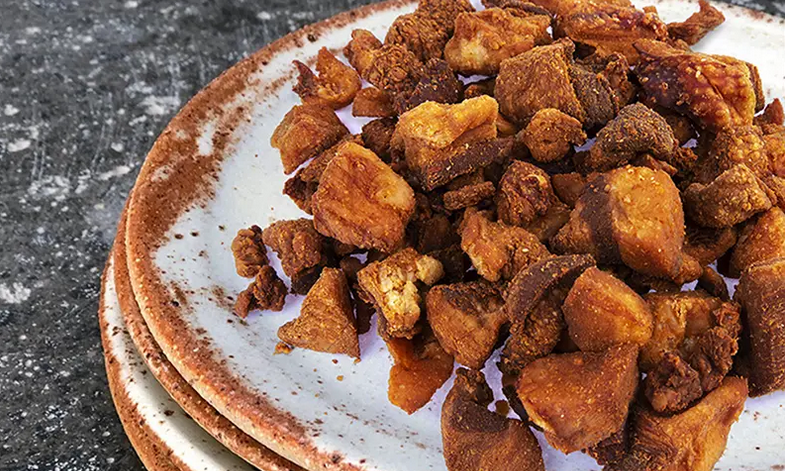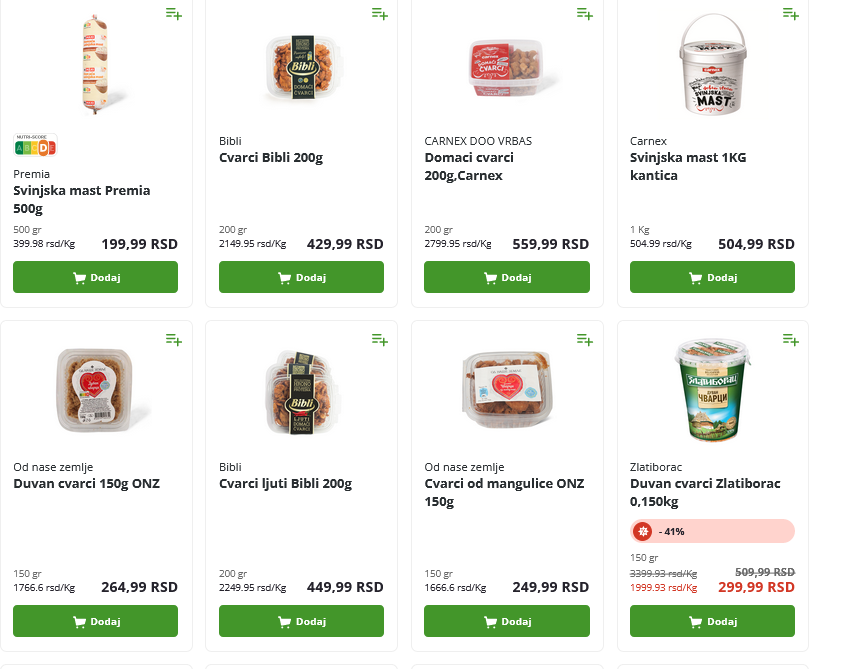
Pork scratchings a luxury, lard shortages in shops
While there is an increasing selection of vegetarian, vegan, gluten- and lactose-free products, exotic fruits, vegetables and special spices on supermarket shelves in Serbia, the sale of traditional products, characteristic of the region, have drastically plunged. Lard can hardly be found, and the price of pork scratchings exceeds even that of quality meats.
Pig slaughters are disappearing, but people seek traditional favourites in supermarkets
According to Serbian custom, the period of traditional pig slaughters begins at the end of November. This is for practical reasons: from this time onwards the temperature falls to the point which makes the outdoors processing of meat safe. In Tito’s Yugoslavia, pig killings were often held on 29 November, which was a national holiday celebrating the foundation of the republic. The date still evokes nostalgia in many people who set this day as the date for slaughtering their pigs. That is for those who still keep the tradition, as this old custom is disappearing also in Serbia. However, the demand for the culinary delights of pig slaughtering feasts has not waned. Pork scratchings, for example, are still coveted in Serbia, with people seeking them out in supermarkets.
Their time has come
It was met with general hysteria among customers and the Serbian press that a kilogram of good-quality scratchings can cost up to 2000 dinars (17 euros). Articles have been published with the titles „A fat pig is now a goldmine,” or „The poor man’s food has become the rich man’s privilege.” Experts interviewed by the papers, „the great moment for pig-slaughtering farmers has come,” as the price of scratchings, which used to be a by-product of lard production, has never been this high. The price tag of 2000 dinars far exceeds the supermarket price of pure pork meat, and even that of beef and quality fish. Customers, however, are not deterred by this fact.
V4NA was told that in one of the small supermarkets in Serbia, which occasionally sells fresh home-made scratchings, people rush to buy it up as soon as it arrives. Better-off customers buy a kilogram, while those with thinner wallets buy a third or a fifth of a kilo.
„Anyone who walks in and smells it will buy it,” said the assistant. International chain stores are also trying to respond to market demands, offering pre-packaged, factory-made scratchings, mostly produced by Serbian meat plants. The stores charge on average 20 euros per kilogram.

Price of lard has also leaped
Pork fat became very much sought-after in Serbia’s shops in the weeks following the outbreak of the Ukraine-Russia war. As among foodstuffs sunflower oil was the first to rise in price, many people returned to using traditional cooking fat. At that time, a kilo of pork lard sold for 200-250 dinars, roughly the equivalent of 2 euros. By now, the price of a box of fat has doubled, costing 470-500 dinars, roughly 4-4.5 euros. In addition, lard is increasingly rare to find in stores or at butchers. Now the situation has reversed, with cooking oil costing less as its price has stabilised around 250 dinars (2 euros).
The causes
The jump in the price of scratchings and lard is due to several factors. On the one hand, Serbia’s pig population has decreased significantly. The number of pigs in Serbia has halved compared to twenty years ago, said Zoran Milicevic, the president of an agricultural producers’ associations. Engaging in animal husbandry is is no longer profitable, farmers say, adding that more and more people are liquidating their livestock. The biggest concern for them is soaring feed prices. Corn became more expensive due to the war and the summer drought.
As scratchings can only be made from the thick rind of fattened pigs, which cannot be imported or is difficult to obtain from abroad, locally raised livestock is needed. However, the meat processing sector is suffering from labour shortages, with fewer and fewer skilled butchers working in factories or shops.
Food trends have also changed, according to experts. While scratchings used to be considered the food of the poor, today they are on festive cold meat platters alongside sausages and ham. Speaking about the topic, Radosav Vujic noted that a growing number of people now choose natural, animal-based fats instead of processed, plant-based oils, as some research shows that the former is healthier.
Costumers can still be „satisfied” with prices in Serbia as pork scratchings in neighbouring Croatia reportedly cost three times as much for gourmets, who need to pay 50 euros for a kilo.
Tags:

